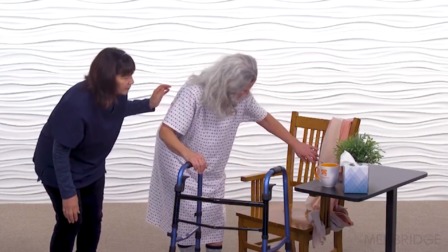Dementia Care: Coping with Challenging Situations in Support & Care
Presented by Teepa Snow
12-Month Subscription
Unlimited access to:
- Thousands of CE Courses
- Patient Education
- Home Exercise Program
- And more
Non-Financial: Teepa Snow has no competing non-financial interests or relationships with regard to the content presented in this course.
This course is designed to help clinicians and direct caregivers better understand why the person they are trying to help frequently exhibits what are seen as difficult or challenging behaviors that make care assistance problematic or even impossible to deliver. The first part of the course will help caregivers more accurately understand many of the commonly occurring ‘behaviors’ they are experiencing with the person they are trying to help. The next part of the course will focus on looking beyond the disease to look for other possible factors that may be causing or contributing to the challenging behavior. Key factors such as life-long personality traits and life experiences and preferences, environmental conditions and cues, other medical, sensory, or psychological conditions, the structure and flow of the day, and caregiver skills and approaches will be discussed with some selected examples demonstrated via role play. Finally, a problem-solving approach will be presented to help learners reduce the intensity, frequency, or occurrence of challenging behaviors as well as guidance in determining “Is it Worth It?” and “Letting It Go!” for healthier relationships and better outcomes.
Meet your instructor

Teepa Snow
Teepa Snow is an advocate for those living with dementia. She has made it her personal mission to help families and professionals better understand how it feels to be living with such challenges and seeks to change and improve life for everyone involved. Her practice has included everything from neuro intensive care units in…
Chapters & learning objectives

1. Challenges Happen; Wonder Why?
This chapter will demonstrate three different challenging behaviors and situations in dementia care.

2. What Can You Do About the Challenges?
This chapter will provide an overview of the six contributing factors to challenging behaviors. This session will also describe the importance of knowing the person’s history and preferences in trying to help with challenging behaviors and refer back to the three examples. This chapter will demonstrate a problem-solving strategy that uses all of these factors to help caregivers come up with a plan that can be used to cope with challenging behaviors. Finally, this chapter will review the value of determining: “Is it worth it?” and “So What!” combined with the importance of learning how to “Let It Go!” as considerations to a less stressful caregiving situation.

3. Pieces of the Puzzle That We Can Control
This chapter will describe the role of the caregiver and caregiver’s approach and interaction in client response and behavior and refer back to the three examples. This session will cover the role of the environment in behaviors or people with dementia and refer back to the three examples. The chapter will also review the role of scheduling and daily routines and activity patterns on client behavior and refer back to the three examples.

4. What Not to Do and What to Do to Cope With Challenging Situations
This chapter will identify the five possible unmet needs that precipitate challenging behaviors and emotional reactions and refer back to the three examples discussed earlier in the course. Additionally, the chapter will review six pieces of the puzzle, five needs, five emotional efforts to communicate when distressed, and use of skills to cope with the immediate issue and plan for care modification to reduce the risk of repetition.
More courses in this series

Overview of Dementia: Alzheimer's, Vascular, Lewy Body, Frontotemporal
Teepa Snow

Dementia Care: Understanding Common Symptoms for Better Care
Teepa Snow

Dementia Care: Reducing the Risk of Challenging Situations
Teepa Snow

Dementia Care: Coping with Challenging Situations in Support & Care
Teepa Snow

Dementia Care: Using the GEMS States Model for Personal Care Tasks
Teepa Snow

Dementia Care: Communicating When Someone Has Dementia
Teepa Snow

Dementia Care: Offering Engagement for People Living With Dementia
Teepa Snow

Dementia Care: Helping as Abilities are Failing and Life is Ending
Teepa Snow